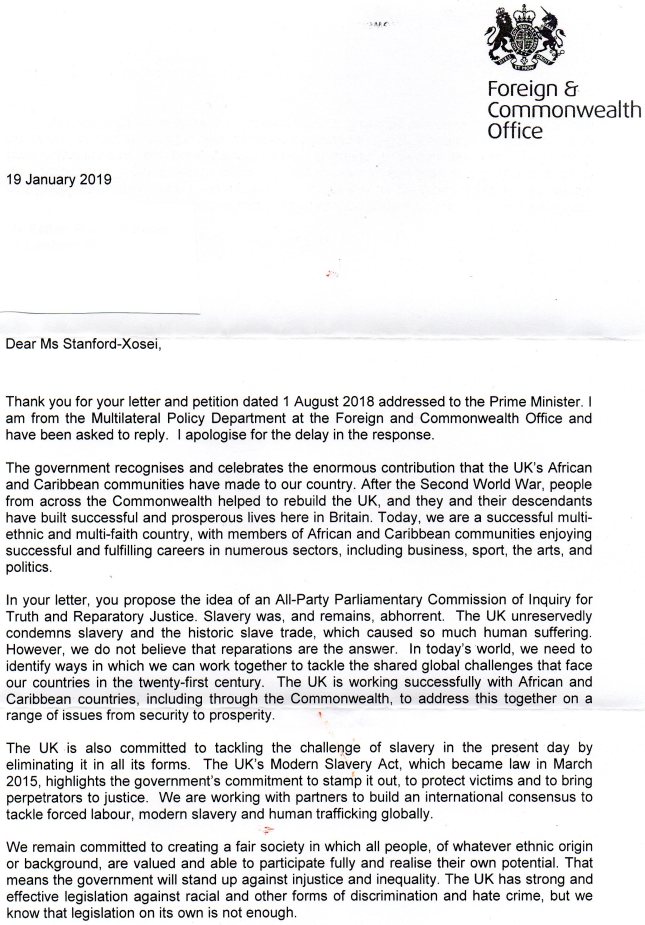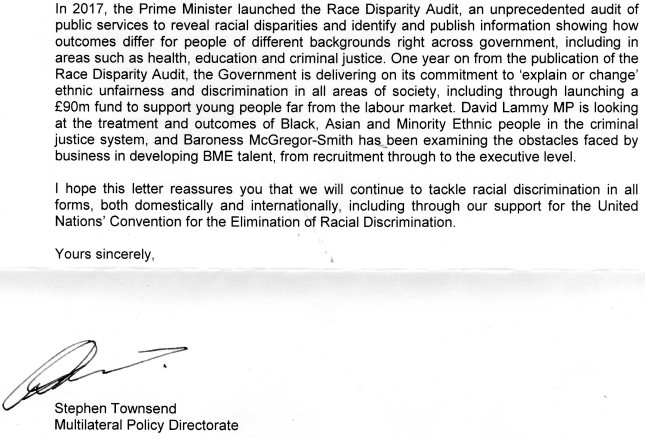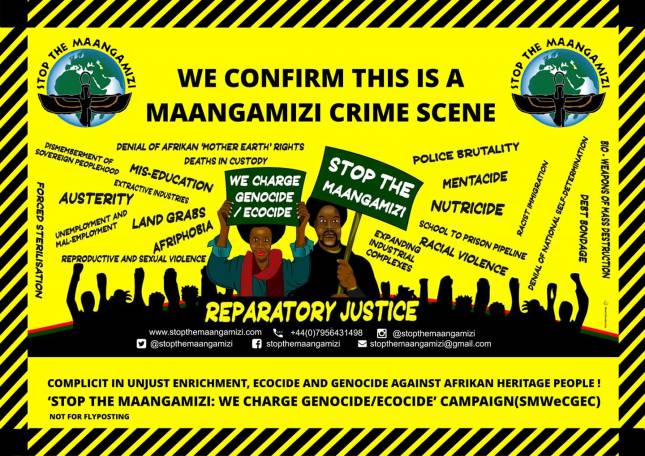This article was revised on 29/06/18


“The use of law as one of the most important instruments of our Afrikan struggle for reparations, indeed the need to locate our claim to restitution for the damages caused by gross violations of Afrikan sovereignty must raise immediately for us the essential questions of whose Framework, whose Law and whose Justice“
Kofi Mawuli Klu ‘Charting an Afrikan self-Determined Path of Legal Struggle for Reparations’, A draft paper for presentation to the 11th December 1993 Birmingham Working Conference of the Africa Reparations Movement, UK, 1993

In the above paper, presented at the African Reparations Movement conference launch in the early 1990’s as a contribution to reparations-movement-building and movement-lawyering, jurisconsult Kofi Mawuli Klu advocates the need for Afrikan people to chart our own self-determined path of legal struggle to enforce and secure reparations. However, this requires decolonisation and repair of the law, legal system and processes. Ahead of his time, Klu asserted the self-rehabilitation and healing in a Fanonian sense that comes about through Afrikans exercising agency in the shaping, making and implementation of international law. This model has subsequently been referred to as international law from below by various legal scholars. Klu affirms seven principles which should be followed in charting an Afrikan self-determined path of legal struggle for reparations. These include:
- Demystification of the law.
- Developing legal creativity and creativity in applying what has been referred to as the ‘legal imagination‘.
- Afrikan popular democratic involvement in the law-making process.
- Recognition of the criminal injustice of enslavement, colonisation and neo-colonisation from the perspective of the legal consciousness of Afrikan people.*
- Judging the crimes and wrongs of enslavement in accordance with Afrikan law.
- Promoting mass adjudication of the Afrikan and other indigenous peoples cases for reparations through grassroots benches of an International Peoples Tribunal on Crimes Against Humanity.
- Developing international legal strategies on the formulation and prosecution of the Afrikan case for reparations.

*Legal Consciousness is the sum of views and ideas expressing the attitude of a group or people toward law, legality, and justice and their concept of what is lawful and unlawful. Legal Consciousness therefore traces the ways in which law is experienced and interpreted by specific individuals and groups as they engage, avoid, or resist the law and legal meanings. Legal consciousness also entails the process by which a group or people concretize their political goals and demands and the means by which they try to give them universal force in the form of laws and policy. It follows that legal consciousness is a form of social consciousness and closely related to political consciousness.

Building on this unrivaled foresight, the ‘Stop the Maangamizi: We Charge Genocide/Ecocide‘ Petition concludes by stating that it “will also galvanise grassroots work towards establishing glocal sittings of the Ubuntukgotla -Peoples International Tribunal for Global Justice (Ubuntukgotla-PITGJ) as part of a series of actions which will put a full stop, by way of holistic and transformative reparations, to all acts of Genocide/Ecocide against Afrikan people.”
What is an International Peoples’ Tribunal?
An international peoples tribunal is a process initiated by communities and/or civil society groupings which seeks to establish whether a state, international organisation, corporation, or less frequently specified individuals have committed breaches of international law or of another body of law or norms, (such as national law, Afrikan law, indigenous law of peoples’ law); which involves the presentation of evidence and arguments to a body of people deemed competent to adjudicate on relevant issues in the best interests of the communities themselves, nations or humanity as whole. In light of documentary and other forms of evidence presented to tribunal members in formal proceedings, it presents a reasoned set of findings based on an evaluation of such evidence and they can also pass judgements. There is however considerable variation in in the emphasis and practice of such tribunals which are also described in various terms such as a people’s tribunal, people’s hearing, or tribunal of conscience.
Seizing back Afrikan people’s power to define, make, shape and advocate for legal strategies and processes in our own best interests and in accordance with Afrikan forms of law and jurisprudence, the term Ubuntukgotla has been chosen to give culturally competent expression to the increasingly popular notion of an international people’s tribunal.
The Ubuntukgotla–PITGJ is a court of peoples humanity interconnectedness. The term is comprised of the Afrikan terms ubuntu and kgotla. A Kgotla is a Tswana traditional institution of participatory democracy, i.e. peoples assembly or court in Botswana which has a number of functions including:
(1) enabling public debate and consultation on policy and legislation;
(2) being a judicial institution in which cases are heard providing access to justice;
(3) soliciting views from the community on government actions and decisions or those of any other interest group; and
(4) facilitating the means to come to an agreement or key issues pertaining to the health and well-being of the community.
The term ubuntu which translates as: “I am because of who we are” is a concept from the Southern Afrikan region which means literally “human-ness”, and is often understood to mean”humanity towards others”. It is also considered, in a more philosophical sense, to mean “the belief in a universal bond of sharing that connects all humanity. In Southern Afrika, ubuntu has come to be used as a term for a kind of humanist philosophy, ethic or ideology, also known as Ubuntuism or Hunhuism propagated in the re-Afrikanisation process of these countries during the 1980s and 1990s.
The Ubuntukgotla–PITGJ is being developed as a site of an activist ‘doing of law’ which also includes knowledge-production and praxis on making, enforcing and implementing just law. Although like other peoples tribunals, it may be perceived as a deviant or even illegitimate ‘institution’ within the institutional landscape of dominant forms of law.

Civil society (peoples’) tribunals initiated by citizens of conscience and oppressed groups have emerged to fill the normative vacuum created by the gap between the ideals, of justice and access to justice. In this regard, people’s tribunals are seen as more effectively responding to the failures, exclusions and mendacity of existing domestic and international state and state sponsored institutions apparatuses to provide effective redress for human, peoples and Mother Earth right violations and atrocities committed, despite having formal power and jurisdiction to do so. They do so by: asserting the rights of peoples (and people) to articulate law that is not dependent on endorsements by states for its legitimacy; as well as utilising, interpreting and developing international and other forms of law.
People’s tribunals can critique the content of existing international law where such law perpetuates oppressive power relations. Oftentimes, peoples’ tribunals have resulted in a greater democratisation of international law-making from below and provided additional accountability mechanisms for the exercise of and abuses/misuse of power by states and international organisations. They have been used by many different peoples and special interest groups.
For example, in 1993 the indigenous people of Hawaii developed the Ka Ho‘okolokolonui Kānaka Maoli-Peoples’ International Tribunal Hawai‘i in which the United States and the state of Hawai‘i were put on trial for crimes against the original people of Hawai‘i, the Kānaka Maoli. A video has been made of this tribunal which we recommend you view. It can be found here.
The Ka Ho‘okolokolonui Kānaka Maoli Tribunal features a panel of international judges that was convened to hear the charges, which included genocide, ethnocide, the taking of their sovereign government and the destruction of their environment. The Tribunal judges and prosecutor/advocates came from Japan, Aotearoa (New Zealand), Jordan, Korea, Afrika, the U.S., Puerto Rico and the Cree, Cherokee, Shawnee and Creek nations. It traveled to five islands to see and hear firsthand the words and personal experiences of witnesses, many of whom faced arrest and eviction from native lands. At the end of ten days, the Tribunal called upon the United States and the world to recognise the fact that Hawaian sovereignty has never been extinguished. It also called for the restoration and return of all lands to which Kānaka Maoli have a claim.
Peoples’ tribunals are formed to take up a variety of cases that may fall under the following, sometimes overlapping, categories:
- Violations by the state of the rights of citizens or residents of that state, including violations of the rights of peoples within that state;
- Claims of the denial of the right to self-determination;
- The treatment by regions or groups of states of particular groups of people;
- Historical injustices such as conquest, enslavement, colonisation and other thematic issues;
- The role of international organisations, especially international financial institutions, in the regulation of the international and national economic and social systems;
- The interaction between state law and the violations of the rights of persons by ‘private’ individuals (including corporations) and the responsibility of business, especially transnational corporations, in the violations of human rights.
In most cases, peoples’ tribunals arraign individual states, international organisations, corporations or combination of these. In some cases peoples’ tribunals ‘put on trial’ named individuals.
See ‘Peoples International Tribunals and International Law‘, edited by Andrew Byrnes, and Gabrielle Simm, Cambridge University Press, (2018) pp. 16-17 for more info.
How will the Ubuntukgotla-PITGJ operate?
As a people’s tribunal, the Ubuntukgotla-PITGJ derives its power from the voices of Afrikan heritage community victims and survivors, and also those of national and international civil societies with relevant knowledge and expertise to establishing and providing evidence on the concrete manifestations of the Maangamizi including the genocide of Afrikan heritage communities. The Ubuntukgotla-PITGJ will have the format of a formal human rights court,however, it is not a criminal court in the sense that individual persons are indicted. In the first instance, the prosecutors will indict the state and institutions of the UK, based on the proofs presented of responsibility for the widespread and systematic crimes against humanity committed in the current phase of the Maangamizi. It is expected that, as support for and the influence of the U-PITGJ grows, it will be also be able to build the capacity to address other instances of genocidal crimes that have been perpetrated on other peoples who have experienced European settler colonialism, conquest and invasion. This is why it is important to recognise the interconnections between the International Social Movement for Afrikan Reparations (ISMAR) and the Peoples Reparations International Movement (PRIM).
The proof presented will consist of documents, audiovisual materials, statements of witnesses and other recognised legal means. The power of the Ubuntukgotla-PITGJ will be to examine the evidence, develop an accurate historical and scientific record and apply principles of international law to the facts as found. It is expected that the chosen judges will produce a verdict based on the material presented and call upon the Government of the UK to realise that so far they have failed to take legal and moral responsibility for the victims. This verdict can also be used as a basis for an United Nations resolution and other actions on these crimes.
How can the Ubuntukgotla-PITGJ contribute to Afrikan people’s empowerment and healing?
- By taking as its primary source the voices, experiences, aspirations, demands and visions for reparatory social change of the peoples’ and communities of the violated themselves, from which all other specialist support groups – lawyers, the media, politicians, institutionalised academics, economists, and others – may build upon by utilising their specialist languages for resistance in diverse sites of public judgement.
- Through establishing informal but public and ‘judicial’ processes to deal with atrocities committed by States resulting in the moral power and authority of informal quasi judicial processes.
- Through giving effect to Afrikan peoples’ voices of judgement, developing and disseminating the often silenced articulations of Afrikan people’s legality as part of a legal strategy of resistance whose contribution is to advance, through the specific language of law, the broader struggles against the violence of the Maangamizi today.
Volunteer researchers required to contribute to a people’s history-making process of securing reparatory justice!

If you are a law or politics student or have other relevant skills and experience and you are interested in using your knowledge and skills to support Afrikan people’s struggle for holistic redress and secure Afrikan Reparatory Justice, you can become a volunteer researcher. We are looking for volunteer researchers who would like to join the SMWeCGEC research team in preparations for establishing the APPCITARJ and the Ubuntukgotla-PITGJ.
If you would like to get involved, please contact: Afrikan Reparations Transnational Community of Practice (ARTCoP) on artcop.edu@gmail.com or PARCOE on info@parcoe.com or 07751143043.
Support from movement lawyers is also welcome!
If you are a social justice advocate, legal practitioner or cause lawyer and would like to offer pro-bono advice or support to this community-led initiative; are willing to build equitable relationships with people and organisations challenging historical and contemporary injustice; and are prepared to respect the approach of social justice/community lawyering,*please also get in touch as above.
*Community lawyering has many variants: collaborative lawyering, community, lay lawyering, cause lawyering, social justice lawyering, political lawyering, critical lawyering, rebellious lawyering, movement-lawyering etc. The common thread among them is that the clients, not the lawyers, play a central role in resolving the issues that have an impact on their opportunities to succeed. It is: lawyering that is community-located, community-collaborative, community-directed and based on the collaboration of lawyers, clients and communities in which they live; and transforming law and lawyering to address the inequalities experienced by subordinated and underserved groups. The legal system in the UK and other Westernised countries is very individualistic. It tends to atomise and depoliticise disputes, which work against a community organising model. Furthermore, the facilitation of individual rights has not benefited the long-term needs of communities, especially impoverished communities, especially where such impoverishment is as a result of intergenerational injustice. The Sargent Shriver National Centre on Poverty Law (USA) defines “community lawyering” as a “process through which advocates contribute their legal knowledge and skills to support initiatives that are identified by the community and enhance the community’s power.”
Similar to the different schools of thought in community organising, community lawyering has many different strains. However, what sets lawyers who adopt community lawyering apart from each other boils down to their answers to the following three questions: Who do you work with? What do you do for them? And how do you work together? Similar to community organising, the answers to these questions vary depending on the political orientation of the lawyer and the theory of social change they ascribe to. By combining legal recourse and community organising, it is possible to utilise “community lawyering” as a social change strategy.” This approach engages lawyers who are prepared to de-emphasise litigation as the primary tool for advancing social justice. Instead, community lawyering encourages such lawyers, in collaboration with communities, their groups, activists and organisers, to critically and creatively examine non-traditional forms of advocacy such as facilitative leadership, institution-building, community organising, collective action and other grassroots actions including strategic litigation, media events, community education workshops and public demonstrations. This is done as a way of addressing the legal and non-legal problems of their clients.
Community lawyering can also be described as a more participatory process that fosters collaboration between lawyers and their community (group) clients, rather than fostering—if not perpetuating—the dependency that most clients have on their lawyers to solve their legal problems in a conventional lawyer-client relationship.
The role of a “community lawyer” entails working in partnership with one’s community clients and utilises multiple forms of advocacy, to address their individual as well as systemic problems. Community lawyering practitioners recognise that their clients are partners—not just in name—but in leadership, control and decision-making. Through collaboration, lawyers can support Afrikan Heritage Community groups in building their own resources and community capacities to advance their own interests in effecting and securing reparatory justice in a self-determined and self-directed manner.
Another critical component of community lawyering is creating race-conscious cultural competence—a set of beliefs, values, and skills built into a structure that enables one to negotiate cross-cultural situations in a manner that does not force one to assimilate to the other. The goal of race-conscious community lawyering is to support lasting structural and systemic changes that will bring about holistic reparatory justice for racialised groups.
Movement-lawyering is a specific form of community lawyering but the lawyers work in collaboration with grassroots movements. This lawyering recognises that community members and organisers have expertise that should be valued. In fact, movement lawyers should also be engaged in a process of political study and growth collectively with movement-organisers that are aligned with particular community struggles. Here are some tips for lawyers that are aligned with movements and are particularly relevant to how lawyers can best support communities, their activists and organisers who are engaged in reparatory justice struggles as part of the ISMAR.

















